#history education
Text
like okay
history professionals in educational settings should not be going “oh my GOD the Victorians wore HUMAN HAIR in their jewelry!!! can you BELIEVE???” in tones of utter disgust
if your audience comes away with the impression that historical people were weird gross aliens we cannot possibly understand or relate to, you have failed
#history#dress history#fashion history#victorian#public history#history education#if you personally are grossed out by human hair I'm sorry but. your job is not to editorialize#your job is to teach people about the past#THEY didn't see it that way#and your job is to make your audience understand what something- in this case hairwork -meant in its historical context
717 notes
·
View notes
Text
it doesn't matter at what level you took history classes so long as you took history classes in a public or charter school
reblog for a greater sample size if you want
#history#us history#texas history#texas politics#txpol#us politics#uspol#education#history education#polls#i love polls
24 notes
·
View notes
Text
My Gravestone Maintenance Program was approved!!!!

My Museum/Historical Society is located on the East Coast, and (as many know) there are a lot of gravesites - from unkept, unknown, and abandoned sites, to more known town cemeteries.
I am personally super interested in gravestone conservation and interpretation, something which my work fully supports me including more in our programming :)
Last October, I was able to lead a walking tour through a local cemetery to talk about the history of gravestone symbology, art, and the interpretations of local history through cemeteries
The interest this walk drew inspired the creation of a larger program to happen this summer, where I get to not only teach more on gravestone symbology, but also teach basic grave cleaning to community members!!! I am especially excited because my town has a deep history of fraternal orders, and so many of the gravestones have some really neat art reflecting the different orders
(featuring a photo of tugboat with my AGS sticker)
#museums#local history#historical society#history#museum curator#museum studies#museum life#grave maitnence#grave stone studies#grave art#art history#spooky#cemetery#orange cat#east coast#gravestones#programming#non profit#education#history education
17 notes
·
View notes
Text
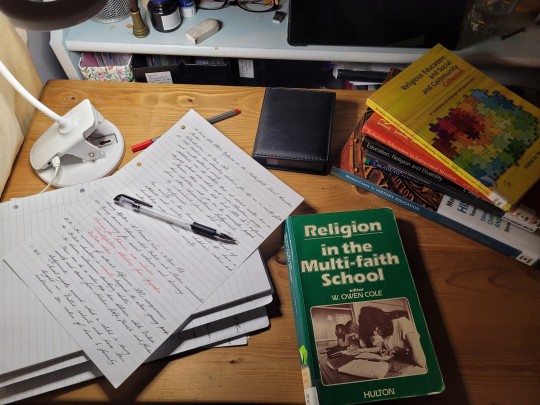
10.01.2023 - I'm back studying full time for my PGCE and assignment work is kicking in with a vengeance. I'm writing about religion as a protected characteristic in history education - safe to say there is NOT a lot written about it. This is concerning considering how many kids have told me they feel excluded from school history because it's so white and Christian OR the number of kids who tell me all Christians are "sinister, evil brainwashers" (yes real quote from an exam paper I marked before Christmas!) My inner activist is coming out...
Currently reading: Shakespearean by Robert McCrum; The Red and the Black by Stendhal
36 notes
·
View notes
Text
Well, here we go again, the new Jim Crow is here to tell you how "slavery was good for the slaves, akshually".
Specifically, Florida's new education standards require that students learn "how slaves developed skills which, in some instances, could be applied for their personal benefit" and about "acts of violence perpetrated against and by African Americans" as if racial violence wasn't just one-sided.
Let's hope this type of education designed to facilitate racism doesn't last long.
3 notes
·
View notes
Text
Seeing the way the EXU Calamity cast talks about how they felt while playing, how they saw the Calamity as an amorphous concept and really got perspective of the events when they actually played through it makes me reflect a lot on the true power and opportunity TTRPGs hold.
Imagine historians designing RPG modules and campaigns about real life hystorical events with care and respect as a way to inculcate a more profound sense of empathy and understanding for hystorical events and processes.
I think its a really cool opportunity.
19 notes
·
View notes
Note
How can people be so ignorant to not even know Jewish surnames like Azoff? Thankful to live in north London with a big population of Jewish people.
You answered the question yourself: they do not know any Jews. The reason for THAT when talking about Europeans specifically is that millions of Jews were systematically murdered in the 1940s. Their descendants who would have been our friends never existed.
My mother was raised in a famously Jewish neighborhood in Maryland. One of my teachers growing up was named Eisen and my mother made a remark that he was Jewish and I asked how she could possibly know that. It was then I began to learn about Jewish names.
In college (college!!!) I made a comment to an acquaintance about schlepping a backpack around campus and they looked at me confused and asked, "Are you Jewish?" I didn't make the connection. "You said schlep. That's Yiddish." I told this person that I wasn't Jewish, it was a word my mom used. I asked her recently why she never told me that all these words she used were Yiddish and she shrugged and said, "I guess I never thought of it that way, I just picked it up playing at the Bernsteins' house as a kid."
Where I grew up, there were no Bernsteins. Had I grown up where I was born, Galveston, I would have had Jewish friends as a child. As an adult, I do have Jewish friends. I have Jewish family now, too. My life is better for knowing them.
#antisemitism#history education#these are the results of the horrors of the past#and that people just ignore it is ... insane to me
6 notes
·
View notes
Text
You know "we only make it up to WWI every year in (American) history class" is gonna start being weirder as time moves on and the period afterwards drops out of living memory
5 notes
·
View notes
Text
1963 Refrigerator 🤔
#pay attention#educate yourselves#educate yourself#knowledge is power#reeducate yourself#reeducate yourselves#think about it#think for yourselves#think for yourself#do your homework#do some research#do your own research#ask yourself questions#question everything#american history#history lesson
67K notes
·
View notes
Text
Women's Not So Distant History
This #WomensHistoryMonth, let's not forget how many of our rights were only won in recent decades, and weren’t acquired by asking nicely and waiting. We need to fight for our rights. Here's are a few examples:

📍 Before 1974's Fair Credit Opportunity Act made it illegal for financial institutions to discriminate against applicants' gender, banks could refuse women a credit card. Women won the right to open a bank account in the 1960s, but many banks still refused without a husband’s signature. This allowed men to continue to have control over women’s bank accounts. Unmarried women were often refused service by financial institutions entirely.
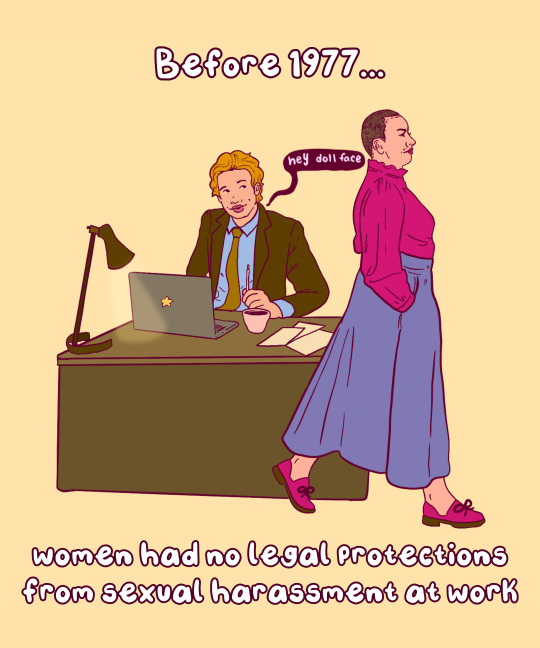
📍 Before 1977, sexual harassment was not considered a legal offense. That changed when a woman brought her boss to court after she refused his sexual advances and was fired. The court stated that her termination violated the 1974 Civil Rights Act, which made employment discrimination illegal.⚖️
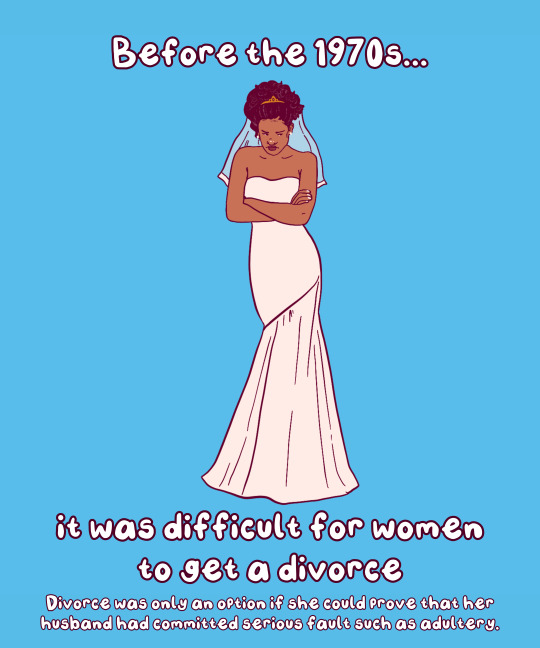
📍 In 1969, California became the first state to pass legislation to allow no-fault divorce. Before then, divorce could only be obtained if a woman could prove that her husband had committed serious faults such as adultery. 💍By 1977, nine states had adopted no-fault divorce laws, and by late 1983, every state had but two. The last, New York, adopted a law in 2010.
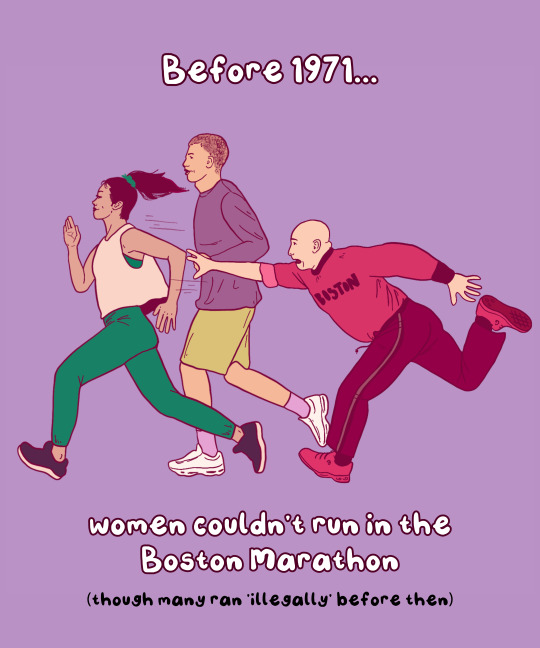
📍In 1967, Kathrine Switzer, entered the Boston Marathon under the name "K.V. Switzer." At the time, the Amateur Athletics Union didn't allow women. Once discovered, staff tried to remove Switzer from the race, but she finished. AAU did not formally accept women until fall 1971.

📍 In 1972, Lillian Garland, a receptionist at a California bank, went on unpaid leave to have a baby and when she returned, her position was filled. Her lawsuit led to 1978's Pregnancy Discrimination Act, which found that discriminating against pregnant people is unlawful
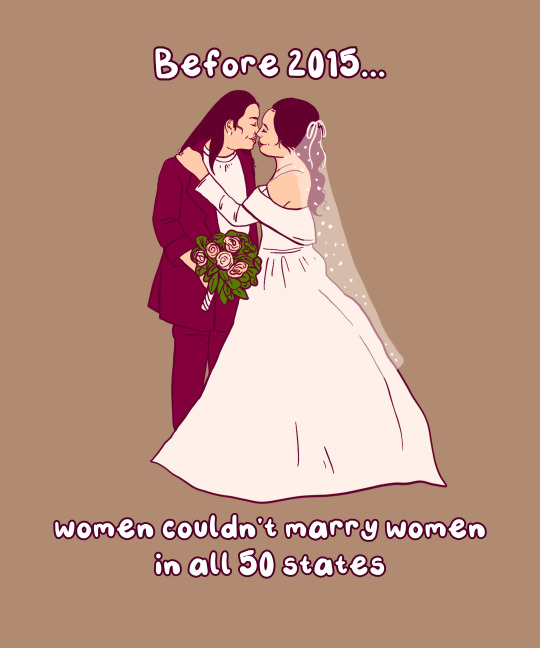
📍 It wasn’t until 2016 that gay marriage was legal in all 50 states. Previously, laws varied by state, and while many states allowed for civil unions for same-sex couples, it created a separate but equal standard. In 2008, California was the first state to achieve marriage equality, only to reverse that right following a ballot initiative later that year.

📍In 2018, Utah and Idaho were the last two states that lacked clear legislation protecting chest or breast feeding parents from obscenity laws. At the time, an Idaho congressman complained women would, "whip it out and do it anywhere,"
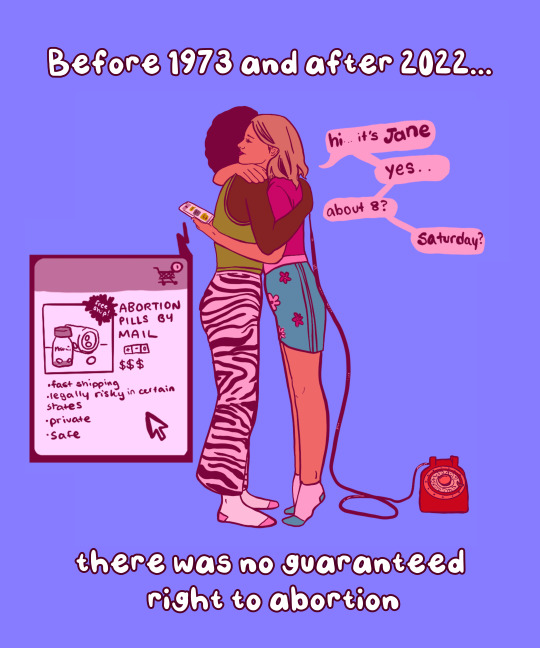
📍 In 1973, the Supreme Court affirmed the right to safe legal abortion in Roe v. Wade. At the time of the decision, nearly all states outlawed abortion with few exceptions. In 1965, illegal abortions made up one-sixth of all pregnancy- and childbirth-related deaths. Unfortunately after years of abortion restrictions and bans, the Supreme Court overturned Roe in 2022. Since then, 14 states have fully banned care, and another 7 severely restrict it – leaving most of the south and midwest without access.
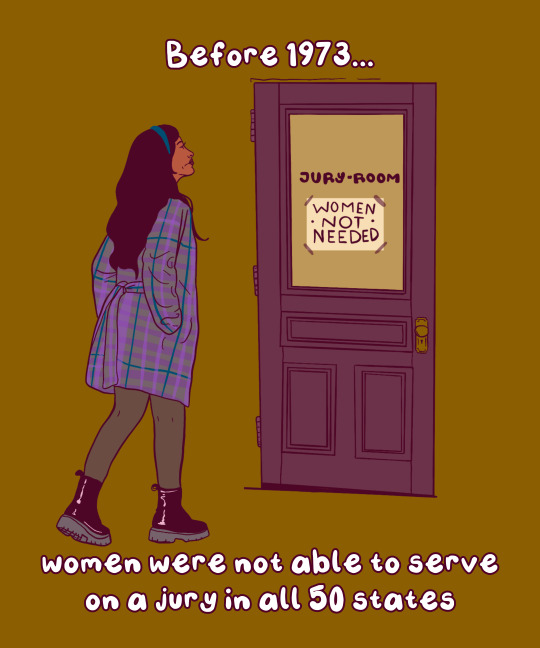
📍 Before 1973, women were not able to serve on a jury in all 50 states. However, this varied by state: Utah was the first state to allow women to serve jury duty in 1898. Though, by 1927, only 19 states allowed women to serve jury duty. The Civil Rights Act of 1957 gave women the right to serve on federal juries, though it wasn't until 1973 that all 50 states passed similar legislation

📍 Before 1988, women were unable to get a business loan on their own. The Women's Business Ownership Act of 1988 allowed women to get loans without a male co-signer and removed other barriers to women in business. The number of women-owned businesses increased by 31 times in the last four decades.
Free download
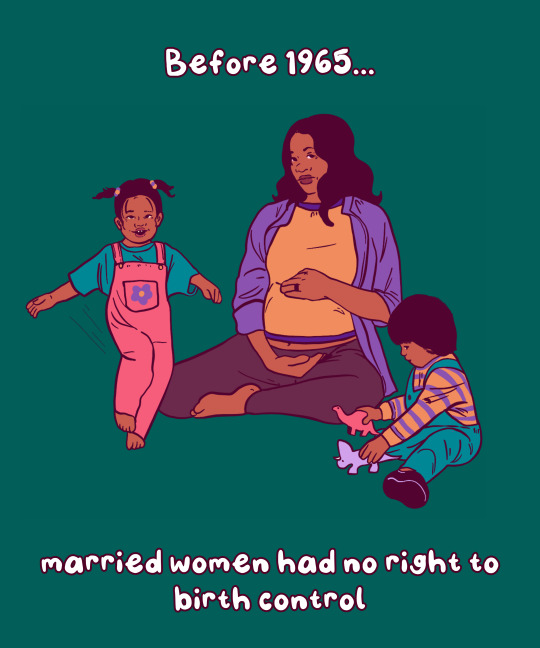
📍 Before 1965, married women had no right to birth control. In Griswold v. Connecticut (1965), the Supreme Court ruled that banning the use of contraceptives violated the right to marital privacy.
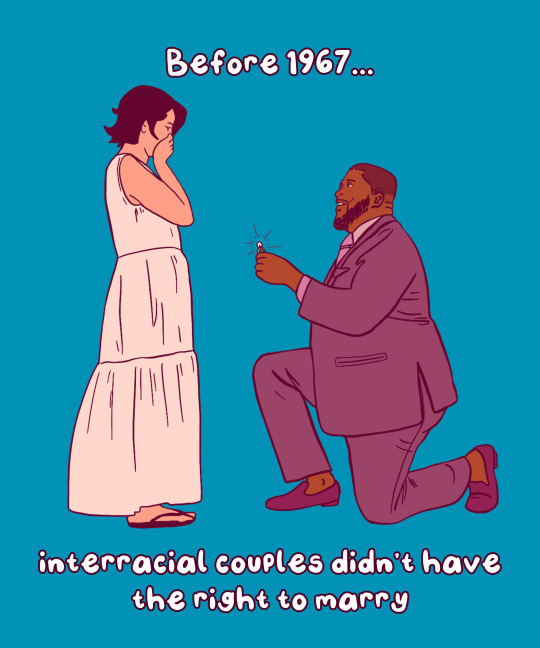
📍 Before 1967, interracial couples didn’t have the right to marry. In Loving v. Virginia, the Supreme Court found that anti-miscegenation laws were unconstitutional. In 2000, Alabama was the last State to remove its anti-miscegenation laws from the books.

📍 Before 1972, unmarried women didn’t have the right to birth control. While married couples gained the right in 1967, it wasn’t until Eisenstadt v. Baird seven years later, that the Supreme Court affirmed the right to contraception for unmarried people.
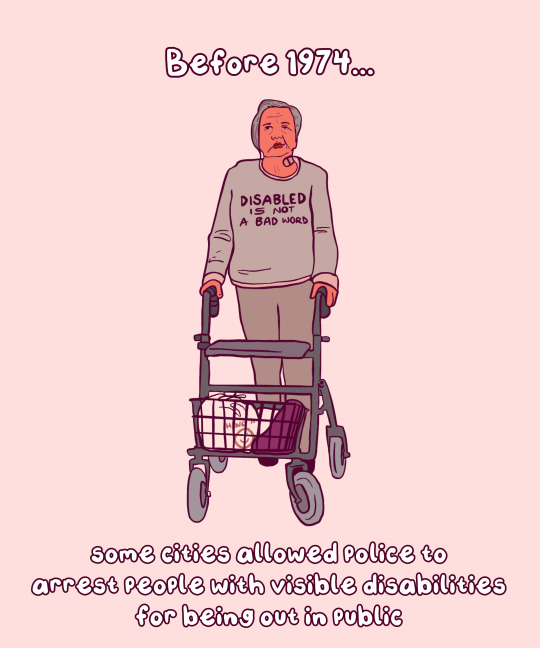
📍 In 1974, the last “Ugly Laws” were repealed in Chicago. “Ugly Laws” allowed the police to arrest and jail people with visible disabilities for being seen in public. People charged with ugly laws were either charged a fine or held in jail. ‘Ugly Laws’ were a part of the late 19th century Victorian Era poor laws.

📍 In 1976, Hawaii was the last state to lift requirements that a woman take her husband’s last name. If a woman didn’t take her husband’s last name, employers could refuse to issue her payroll and she could be barred from voting.

📍 It wasn’t until 1993 that marital assault became a crime in all 50 states. Historically, intercourse within marriage was regarded as a “right” of spouses. Before 1974, in all fifty U.S. states, men had legal immunity for assaults their wives. Oklahoma and North Carolina were the last to change the law in 1993.
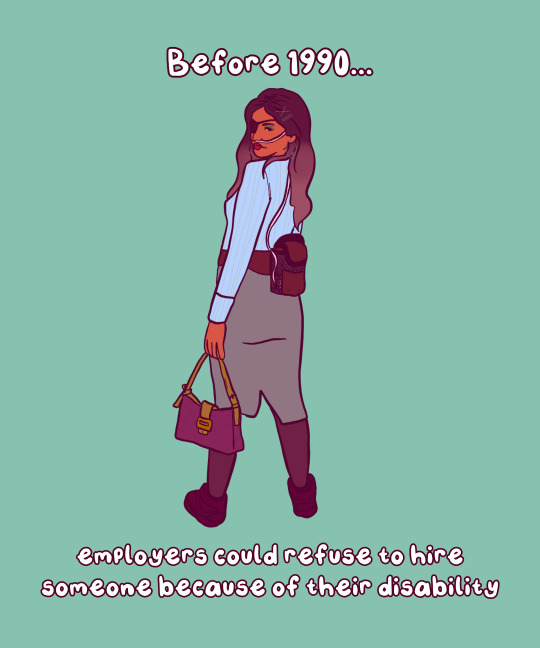
📍 In 1990, the Americans with Disability Act (ADA) – most comprehensive disability rights legislation in U.S. history – was passed. The ADA protected disabled people from employment discrimination. Previously, an employer could refuse to hire someone just because of their disability.
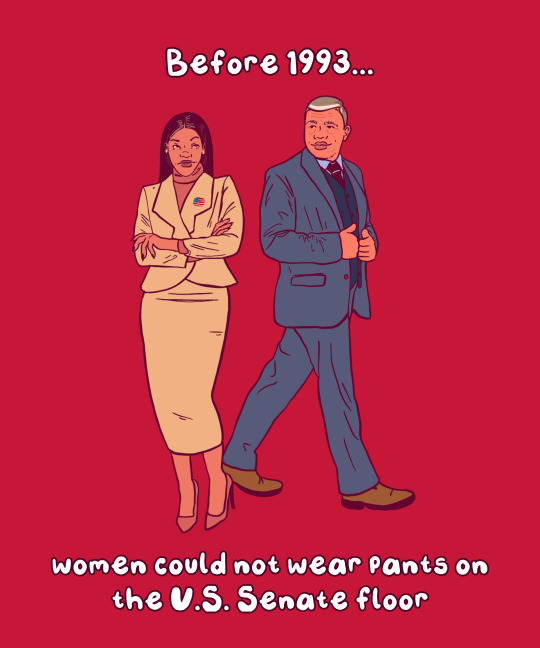
📍 Before 1993, women weren’t allowed to wear pants on the Senate floor. That changed when Sen. Moseley Braun (D-IL), & Sen. Barbara Mikulski (D-MD) wore trousers - shocking the male-dominated Senate. Their fashion statement ultimately led to the dress code being clarified to allow women to wear pants.

📍 Emergency contraception (Plan B) wasn't approved by the FDA until 1998. While many can get emergency contraception at their local drugstore, back then it required a prescription. In 2013, the FDA removed age limits & allowed retailers to stock it directly on the shelf (although many don’t).
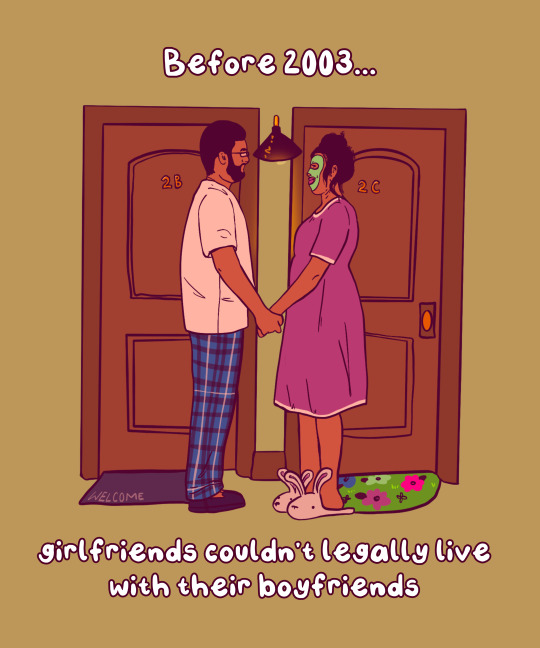
📍 In Lawrence v. Texas (2003), the Supreme Court ruled that anti-cohabitation laws were unconstitutional. Sometimes referred to as the ‘'Living in Sin' statute, anti-cohabitation laws criminalize living with a partner if the couple is unmarried. Today, Mississippi still has laws on its books against cohabitation.
#art#feminism#women's history#women's history month#iwd2024#international women's day#herstory#educational#graphics#history#70s#80s#rights#women's rights#human rights
15K notes
·
View notes
Text
Exploring Indy's History with Sampson Levingston
🚶♂️📚 Dive into Indy's past with historian Sampson Levingston on #InTheLoopTVShow! Join us as we explore the city's rich history and cultural heritage through Sampson's unique Walking Talks. A journey of discovery awaits! 🏙️ #LocalHistory
In a vibrant and enlightening segment of “In The Loop TV Show,” viewers are treated to an up-close encounter with Sampson Levingston, a captivating figure in the Indianapolis community known for his profound love and knowledge of local history. Hosted by the dynamic Renée Michelle Merrifield and expertly produced by Jason Aaron, the episode skillfully navigates through Sampson’s unique blend of…
youtube
View On WordPress
#African American History#community impact#Downtown Champion Award#Historical Tours#History Education#In the Loop TV Show#Indiana Culture#Indianapolis History#Jason Aaron#Local Historian#Renée Michelle Merrifield#Sampson Levingston#Walking Talks#Youtube
0 notes
Note
People Just Lie About History moment i experienced today that i thought you might appreciate: i'm a teaching assistant (as of this week!) one of the religious studies teachers told a whole class of 12 year olds that life expectancy in roman times was about 30, so 90 years in biblical times is 300 years in modern times. (as in life expectancy = life span)
it's absolutely astounding how much teachers just seem to make up.
God.
That's a popular theory I've heard, but it ignores the apparently not-so-well-known fact that "life expectancy in the 30s"usually doesn't mean everyone keeled over at 35.
It means that infant, child, and childbirth mortality was high enough to massively skew the average.
If you lived to adulthood (and past childbearing years, for most AFAB folks), guess what? You had a fair chance of making it to old age! 90 years in Biblical times was just like 90 years in modern times! Whether you believe lifespans like that of Methuselah were literal, poetic hyperbole, or a secret third thing, "most people died at age 30" is not the answer!
I feel like teachers' history training must be very light on social history and heavy on names and dates- someone else once told me they got into an argument with a teacher claiming that the term "straitlaced" came from the fact that Victorian ladies laced their corsets "straight" so they'd be harder to get off and thus demonstrate the wearer's propriety. Yes, really.
Obviously nobody can know EVERYTHING about history, and teachers have enough pressure on them already to get through massive chunks of the info necessary to understand how our world came to be. But I feel like there should be emphasis placed on critical thinking, too- about whether unsourced (or unreliably sourced) information makes any sense given the facts they know. And just like...basic typical human behavior.
(Eg. "if everyone died at 30 in Roman times, why are there so many statues and paintings of visibly elderly people? why are there a lot of children's graves, and then many for people aged 50, 60, or even 70?" or "why would Victorian woman bother showing their virtue through garments nobody else ever saw?")
217 notes
·
View notes
Text
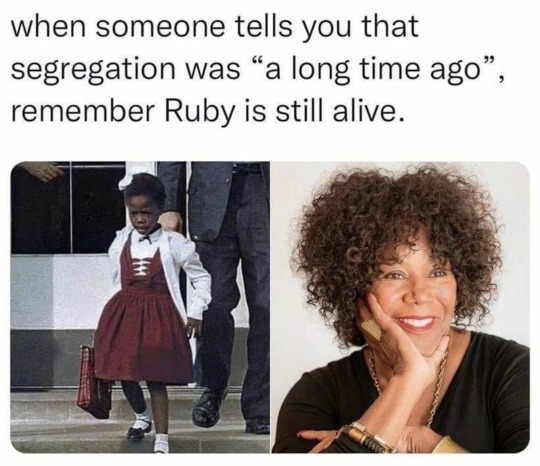
#blackgirlmagic#black history#black excellence#black lives matter#black queen#Blackstrength#afrocentric#black power#segregation#civil rights#black education#ruby bridges
39K notes
·
View notes
Text

6K notes
·
View notes
Text
Please help the National Museum Of Wales

Please sign the petition!!!!
You don't need to be living in Wales or the uk to sign.
#wales#welsh#museum#history#petition#signal boost#geology#paleontology#palaeoblr#support education#support history
3K notes
·
View notes
Text
Here's some queer history in honor of the approaching Pride month.
It's an acronym.

The organization shut down in 1968 due to pressures from both straight and queer parties (there's always been those gays more concerned with being seen as normal than actual progress) but they permanently changed the face of the queer rights movement and their spirit lived in to today.
5K notes
·
View notes